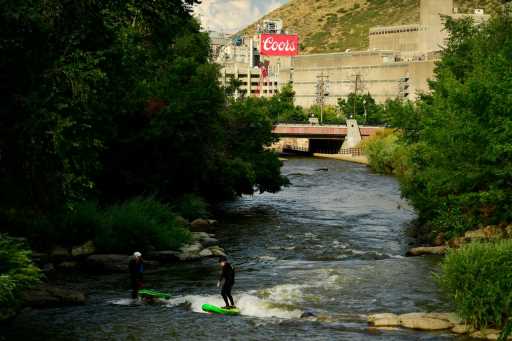Colorado considers new plan to reduce greenhouse gas emissions
Colorado’s air-quality regulators this week will consider a plan for the state’s 18 largest manufacturers to reduce their greenhouse gas emissions, but it’s running into sharp criticism from legislators and environmentalists who are concerned about a loophole that could allow companies to buy their way out of making cuts.
The 18 companies, which include Molson Coors, Cargill Meat Solutions, Microchip Technology, Leprino Foods, Natural Soda, Western Sugar Cooperative and Suncor Energy, also oppose the state’s plan, saying it will place a regulatory burden on them that could force the companies to eliminate jobs or relocate out of Colorado.
Ahead of this week’s hearing to finalize the rule, 16 state legislators who created the law that mandates the reduction in emissions sent a letter to the Colorado Air Quality Control Commission to voice their concerns. Opposition also is coming from the advisory council created to guide the Colorado Department of Public Health and Environment as it writes rules to protect vulnerable communities from air pollution.
Environmentalists say the climate crisis is too severe to cave in to opposition from large, profitable corporations and now is the time to act.
“What really keeps me up at night is if we can’t stand up against some very powerful companies, how are we going to solve climate change?” said Collin Tomb, Boulder County’s climate and health strategist. “We need to show that we have courage.”
The state’s Air Quality Control Commission, a board appointed by the governor to regulate emissions, will begin considering the new rules during a public hearing at 4:35 p.m. Wednesday. In Colorado, the Air Pollution Control Division, which falls under the state health department, writes the rules, which the commission must approve.
The requirements for manufacturers to reduce greenhouse gas emissions are the result of House Bill 21-1266, also known as the 2021 Environmental Justice Act, which was intended to reduce pollution in disproportionately impacted communities such as Commerce City, north Denver and Pueblo.
The 18 companies represent about 15% of all climate pollution coming from industrial and manufacturing facilities in Colorado, according to a document filed in advance of the hearing by the Air Pollution Control Division.
Greenhouse gases include carbon dioxide, methane, nitrous oxide and fluorinated gases that trap heat in the atmosphere. They can linger in the atmosphere for years, accelerating global warming as they accumulate.
Industrial facilities create greenhouse gases, especially carbon dioxide, through fossil fuel combustion and chemical reactions necessary to make their various products. Fossil fuel combustion in manufacturing accounted for 15% of all carbon dioxide emissions in the United States and 12% of total greenhouse gas emissions in 2021, according to the Environmental Protection Agency.
Colorado politicians and regulators have made reducing greenhouse gas emissions a priority, especially after the Front Range has repeatedly failed to meet National Ambient Air Quality Standards.
“Generate credits by doing nothing”
The commission is attempting to figure out a way for the 18 manufacturers to reduce their greenhouse gas emissions by 20%, based on their 2015 levels. They must achieve that target by 2030 while also reducing other pollutants in communities most impacted by air pollution.
To get there, the state wants to create a system in which the companies could earn credits for reducing emissions before the 2030 deadline and then could sell those credits to other manufacturers that are running behind in meeting the goal, said Megan McCarthy, air quality planner at the Air Pollution Control Division.
Credits would expire after three years so companies cannot stockpile them indefinitely, McCarthy said. The companies could sell the credits on an open market at the best price they can command.
But no one agrees on how the details of how that credit system should work. Four groups, including the Colorado Chamber of Commerce and the Environmental Defense Fund, have submitted alternative plans for creating the credit system, but the Air Pollution Control Division is recommending all four be rejected.
The credit system, as proposed, would reward companies for making no improvements during the next 10 years, allowing them to delay improvements and then buy credits to further postpone necessary investments, said Katie Schneer, a senior analyst on the Environmental Defense Fund’s state climate team.
“One of the concerns is the facilities have target levels that are higher than what they are emitting today,” Schneer said. “So starting in 2024, there are facilities that could generate credits without making changes. They could stay flat and generate credits by doing nothing.”
The Colorado Chamber of Commerce also criticized the credit program in a written statement it submitted to the commission. The proposed credit program does not provide a clear path for companies to comply with the reduction goals, the statement said.
“There are facilities that cannot generate enough on-site reductions (either because they are not cost-effective or technically feasible, or both) to meet their target,” the statement reads. “Those facilities will either rely upon purchases from a credit market or a combination of cost-ineffective projects or cutting production.”
On Thursday, the Chamber sent a letter to Gov. Jared Polis to ask for his support for its plan.
The Chamber sent a statement to the commission and throughout it said the new regulations could force businesses to file lawsuits, lay off workers and reduce production. The proposed rules also could move production to states where greenhouse gas pollution rules are not so stringent.
“As the commission is undoubtedly aware, the effects of (greenhouse gas) emissions increasing in other jurisdictions will not be limited to a single state,” the statement by Doug Benevento and Lynn Kornfeld of the Holland and Hart law firm said. “What will be limited to a single state are the lost jobs and economic growth, and increased prices to consumers — and those impacts will be borne exclusively by Coloradans.”
“A really complicated rule”
But those who live in the communities most impacted by air pollution say they are the ones who are bearing the brunt of harmful air pollution and they are concerned the new rules will fail.
Renee Millard-Chacon, executive director of Womxn From the Mountain, an indigenous nonprofit that works to protect the environment, said the proposed rule is lacking protections for the mostly Latino, Native American and Black people who live in the state’s most polluted communities.
She is opposed to the proposed credit system because it would allow a polluter such as Suncor to buy credits from another company and continue to pollute Commerce City — where she lives and serves on the City Council — at the same levels it is today. She believes there are too many loopholes in the proposal.
“When you hide so many details in the technical language that’s how we know you are creating loopholes,” she said.
Millard-Chacon participated in the state’s effort to define disproportionately impacted communities and remains disappointed in the overall effort to protect her community.
“It’s so egregious. It starts infringing on human rights and civil rights for clean air and water,” Millard-Chacon said. “It’s just gross.”
When the legislature drafted the Environmental Justice Act, it called for the creation of a panel that would advise the Department of Public Health and Environment on how to address climate change.
But that group, called the Climate Equity Community Advisory Council, has informed the Air Quality Control Commission that it prefers the Environmental Defense Fund’s plan over the one written by the state health department.
“The Division’s latest proposal still fails to meet HB 21-1266’s mandate to protect communities and accelerate meaningful, near-term emissions reductions because the proposal retains loopholes for facilities to avoid compliance,” a written statement from the council said.
And five state senators and 11 representatives who crafted the law sent a letter to the commission last month to “express our serious apprehension” over the proposed rule, saying it does not do enough to protect the most vulnerable communities in the state.
The legislators said they not only want the rules to reduce greenhouse gas emissions but also to reduce other air pollutants that come out of industrial manufacturing. The letter also takes issue with the proposed credit system.
“It is essential to protect the rights of the communities disproportionately affected by pollution and to prioritize the reduction of co-pollutants, which play a vital role in safeguarding public health and environmental well-being,” the letter said.
The commission faces a tough decision as it makes the rule. While it will directly impact 18 Colorado businesses it also has implications for other manufacturers as the state tries to cut greenhouse gas emissions.
It’s the second time this year the commission has attempted to write the rule. Earlier this year, it sent regulators at the state health department back to the drawing board after failing to reach a consensus on how a plan should work.
“This is a really complicated rule,” said Michael Ogletree, director of the state’s Air Pollution Control Division. “We’ve been working with all stakeholders for over a year. And we’re now in a place that we’ve done as much as we can to get all groups on board. It’s challenging to make everyone happy. This is kind of striking a good balance, where we’re meeting our requirements and ensuring that we’re protecting public health and reducing emissions by that 20%.”
Get more Colorado news by signing up for our Mile High Roundup email newsletter.
Source: Read Full Article




